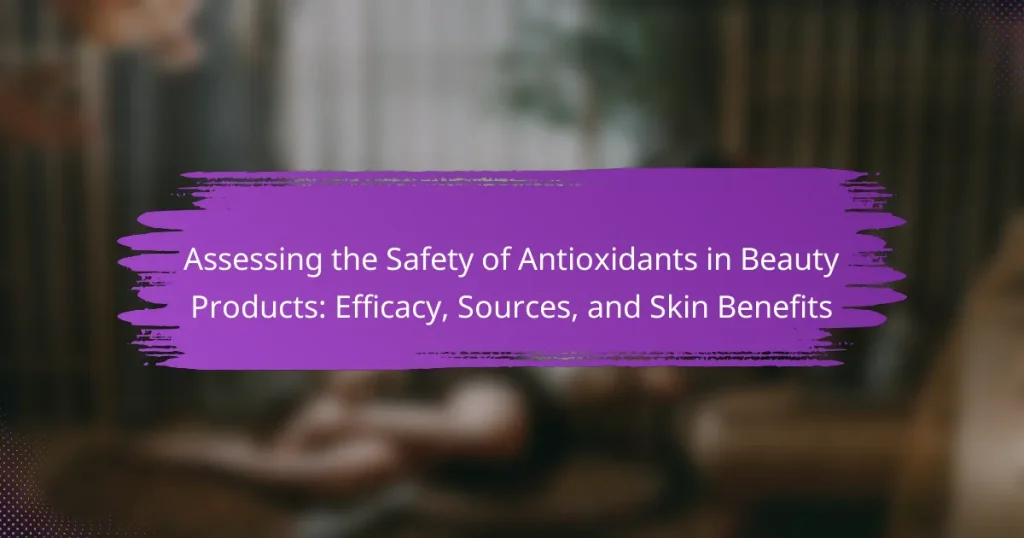Antioxidants are compounds that prevent oxidation and neutralize free radicals, which can damage skin and accelerate aging. This article examines the efficacy of antioxidants in beauty products, highlighting key ingredients such as vitamins C and E, green tea extract, and coenzyme Q10. It reviews scientific studies that confirm the benefits of these antioxidants in improving skin texture, reducing inflammation, and enhancing hydration. Additionally, the article emphasizes the importance of selecting products with verified concentrations of antioxidants and discusses factors consumers should consider to ensure product safety and effectiveness.

What are Antioxidants and Why are They Important in Beauty Products?
Antioxidants are compounds that inhibit oxidation, a chemical reaction that can produce free radicals. Free radicals can cause skin damage, leading to aging and various skin conditions. Antioxidants neutralize these free radicals, protecting the skin from oxidative stress. Common antioxidants in beauty products include vitamins C and E, green tea extract, and coenzyme Q10. These ingredients help to improve skin texture, reduce inflammation, and promote a healthier complexion. Studies have shown that antioxidants can enhance the effectiveness of sunscreen and improve skin hydration. Their inclusion in beauty products is essential for maintaining skin health and preventing premature aging.
How do Antioxidants Function in Skincare?
Antioxidants function in skincare by neutralizing free radicals. Free radicals are unstable molecules that can damage skin cells. This damage leads to premature aging and skin disorders. Antioxidants stabilize these free radicals by donating electrons. Common antioxidants include vitamins C and E, and coenzyme Q10. Research shows that vitamin C can improve skin texture and reduce wrinkles. A study published in the Journal of Clinical and Aesthetic Dermatology found that topical antioxidants significantly enhance skin appearance. Thus, antioxidants are essential for maintaining healthy skin and preventing damage.
What are the key mechanisms of action for Antioxidants?
Antioxidants primarily act by neutralizing free radicals in the body. Free radicals are unstable molecules that can cause cellular damage. Antioxidants donate electrons to these free radicals, stabilizing them. This process helps prevent oxidative stress, which is linked to various diseases and aging. Additionally, antioxidants can chelate metal ions, reducing their potential to generate free radicals. They also regenerate other antioxidants, enhancing overall antioxidant capacity. Studies show that antioxidants like vitamins C and E protect skin cells from UV damage. This protective action contributes to healthier skin and may improve skin aging signs.
How do Antioxidants neutralize free radicals?
Antioxidants neutralize free radicals by donating electrons to them. Free radicals are unstable molecules that can cause cellular damage. This instability arises from having unpaired electrons. When antioxidants donate an electron, they stabilize the free radical. This process reduces oxidative stress in the body. Oxidative stress is linked to various skin issues and aging. Studies have shown that antioxidants like vitamins C and E effectively combat free radicals. Their protective role is crucial in maintaining skin health and preventing damage.
What Types of Antioxidants are Commonly Used in Beauty Products?
Common types of antioxidants used in beauty products include vitamin C, vitamin E, and green tea extract. Vitamin C is known for its brightening properties and ability to combat free radicals. Vitamin E helps moisturize the skin and protect against oxidative stress. Green tea extract contains polyphenols, which provide anti-inflammatory benefits. Other antioxidants like coenzyme Q10 and resveratrol are also popular for their skin-rejuvenating effects. These ingredients are frequently included in serums, creams, and lotions for their protective and restorative qualities.
Which natural sources provide these Antioxidants?
Berries, nuts, and green leafy vegetables are natural sources that provide antioxidants. Berries such as blueberries and strawberries are rich in vitamin C and flavonoids. Nuts like walnuts and almonds contain vitamin E, a powerful antioxidant. Green leafy vegetables, including spinach and kale, are high in carotenoids and other antioxidant compounds. Other sources include dark chocolate, which is rich in flavonoids, and fruits like oranges and grapes that contain various antioxidants. These foods contribute to overall health by neutralizing free radicals in the body.
What synthetic Antioxidants are prevalent in the beauty industry?
Synthetic antioxidants prevalent in the beauty industry include BHT (Butylated Hydroxytoluene) and BHA (Butylated Hydroxyanisole). These compounds are commonly used for their ability to prevent oxidation in skincare products. BHT is known for its effectiveness in stabilizing oils and fats. BHA is often used to extend the shelf life of products by inhibiting rancidity. Both antioxidants help maintain the integrity of formulations. Their use is regulated due to potential skin sensitivity in some individuals. Studies show that BHT and BHA can be effective in protecting skin from oxidative stress.
What are the Safety Concerns Associated with Antioxidants in Beauty Products?
Safety concerns associated with antioxidants in beauty products include potential skin irritation and allergic reactions. Some antioxidants, like vitamin C, can cause sensitivity, especially in individuals with sensitive skin. Additionally, certain antioxidants may degrade when exposed to light or air, reducing their effectiveness. This degradation can lead to the formation of harmful byproducts. For example, when ascorbic acid oxidizes, it can produce reactive oxygen species that may damage skin cells. Furthermore, the concentration of antioxidants in products can also pose risks. High concentrations may lead to adverse effects, including irritation or contact dermatitis. Regulatory bodies, such as the FDA, monitor these concerns but do not always require extensive safety testing for cosmetic ingredients. Hence, consumers should be cautious and perform patch tests before using new products containing antioxidants.
How are Antioxidants evaluated for safety in cosmetics?
Antioxidants in cosmetics are evaluated for safety through a combination of scientific studies and regulatory assessments. These evaluations typically involve toxicological testing to determine potential harmful effects. Researchers assess skin irritation, sensitization, and systemic toxicity through various methods. In vitro tests are often conducted to predict skin reactions before human trials. Regulatory bodies, such as the FDA and EU Cosmetic Regulation, review safety data before approving antioxidant use. The Cosmetic Ingredient Review (CIR) also provides independent safety assessments. This process ensures that antioxidants are safe for consumer use in cosmetic products.
What regulations govern the use of Antioxidants in beauty products?
The regulations governing the use of antioxidants in beauty products primarily fall under the jurisdiction of the U.S. Food and Drug Administration (FDA). The FDA classifies cosmetics, including beauty products, as articles intended for application to the human body. Under the Federal Food, Drug, and Cosmetic Act, products must be safe for use and properly labeled.
Antioxidants must not be misleadingly marketed or labeled. The FDA does not pre-approve cosmetics or their ingredients, but manufacturers are responsible for ensuring product safety. Additionally, the Cosmetics Ingredient Review (CIR) assesses the safety of cosmetic ingredients, including antioxidants, and publishes findings.
In the European Union, the Cosmetics Regulation (EC) No. 1223/2009 governs cosmetic products. This regulation mandates that all cosmetic products must be safe for human health when used under normal or reasonably foreseeable conditions. Manufacturers must conduct safety assessments for their products.
These regulations ensure that antioxidants used in beauty products are safe and effective for consumers.

What Evidence Supports the Efficacy of Antioxidants in Skincare?
Antioxidants in skincare are supported by various scientific studies demonstrating their efficacy. Research indicates that antioxidants, such as vitamin C and E, neutralize free radicals. A study published in the Journal of Clinical and Aesthetic Dermatology found that topical vitamin C significantly reduces photoaging. Another study in the Journal of Investigative Dermatology showed that vitamin E enhances skin barrier function and hydration. Additionally, a review in the Journal of Dermatological Science highlighted the protective effects of green tea polyphenols against UV damage. These findings collectively affirm the role of antioxidants in improving skin health and appearance.
How do Clinical Studies Assess the Benefits of Antioxidants?
Clinical studies assess the benefits of antioxidants by evaluating their effects on human health. Researchers conduct randomized controlled trials to compare antioxidant treatments against placebos. These studies measure specific health outcomes, such as skin elasticity, oxidative stress markers, and inflammation levels. Participants often receive antioxidant-rich supplements or topical applications. Data is collected through clinical evaluations, blood tests, and questionnaires. The results are analyzed statistically to determine the significance of the antioxidant effects. For example, a study published in the Journal of Clinical and Aesthetic Dermatology found that topical vitamin C improved skin appearance in participants. This methodical approach ensures that the benefits of antioxidants are scientifically validated.
What are the common outcomes measured in these studies?
Common outcomes measured in studies assessing antioxidants in beauty products include skin hydration levels, wrinkle reduction, and skin elasticity improvement. Researchers often evaluate changes in skin tone and texture as well. Additionally, studies may measure antioxidant activity and its effects on oxidative stress markers. Clinical trials frequently report adverse reactions to products, such as irritation or allergic responses. These outcomes help determine the overall safety and efficacy of antioxidants in skincare formulations.
How do different skin types respond to Antioxidants?
Different skin types respond uniquely to antioxidants. Oily skin benefits from antioxidants like vitamin C, which helps control excess sebum. Dry skin types respond well to hydrating antioxidants, such as vitamin E, which enhance moisture retention. Sensitive skin may react positively to gentle antioxidants, like green tea extract, reducing inflammation. Combination skin can leverage the benefits of multiple antioxidants, balancing oiliness and dryness. Clinical studies show that antioxidants can improve skin texture and tone across all skin types. For instance, a study published in the Journal of Investigative Dermatology found that vitamin C significantly improved skin hydration and elasticity. Overall, the effectiveness of antioxidants varies based on individual skin characteristics.
What Skin Benefits are Associated with Antioxidant Use?
Antioxidants provide several skin benefits. They protect the skin from oxidative stress caused by free radicals. This protection helps reduce signs of aging, such as wrinkles and fine lines. Antioxidants also promote skin healing and repair. They can improve skin tone and texture by enhancing cellular turnover. Additionally, antioxidants may help reduce inflammation and redness. Studies have shown that topical application of antioxidants can improve skin hydration. For example, Vitamin C, a well-known antioxidant, has been proven to brighten the skin and improve collagen synthesis.
How do Antioxidants improve skin health and appearance?
Antioxidants improve skin health and appearance by neutralizing free radicals. Free radicals are unstable molecules that can damage skin cells. This damage accelerates aging and can lead to wrinkles. Antioxidants like vitamins C and E protect the skin from oxidative stress. They promote collagen production, enhancing skin elasticity. Additionally, antioxidants can reduce inflammation, leading to a more even skin tone. Research shows that topical application of antioxidants can improve skin hydration and texture. Studies indicate that vitamin C can brighten skin and reduce hyperpigmentation. Thus, incorporating antioxidants into skincare can significantly enhance overall skin health and appearance.
What role do Antioxidants play in anti-aging formulations?
Antioxidants play a crucial role in anti-aging formulations by neutralizing free radicals. Free radicals are unstable molecules that can cause oxidative stress, leading to skin aging. Antioxidants, such as vitamins C and E, help to protect skin cells from this damage. They also promote collagen production, which enhances skin elasticity and firmness. Additionally, antioxidants can improve skin hydration and reduce the appearance of fine lines and wrinkles. Studies have shown that regular use of antioxidant-rich products can lead to visibly younger-looking skin. For instance, a study published in the Journal of Clinical and Aesthetic Dermatology found that topical antioxidants significantly improved skin texture and tone.

What Best Practices Should Consumers Follow When Choosing Antioxidant Products?
Consumers should prioritize products with proven antioxidant ingredients. Look for ingredients like vitamin C, vitamin E, and green tea extract. Verify the concentration of these antioxidants in the product. Higher concentrations often indicate better efficacy. Check for third-party testing or certifications that confirm product safety and effectiveness. Research the brand’s reputation and customer reviews for insights on product performance. Be cautious of misleading marketing claims that lack scientific backing. Consider the product’s formulation and compatibility with your skin type. Products should be free from harsh chemicals that may counteract the benefits of antioxidants.
How can consumers identify effective Antioxidant products?
Consumers can identify effective antioxidant products by checking for specific ingredients known for their antioxidant properties. Ingredients such as vitamin C, vitamin E, and coenzyme Q10 are widely recognized for their efficacy. Consumers should also look for products with a high concentration of these ingredients. The packaging often indicates the percentage of active ingredients, which can help assess effectiveness. Moreover, consumers can examine product reviews and clinical studies that support the claims made by manufacturers. Research shows that products containing a combination of antioxidants may provide enhanced benefits. Additionally, consumers should consider the product’s stability and expiration date, as antioxidants can lose potency over time.
What ingredients should be prioritized or avoided?
Prioritize antioxidants like vitamin C, vitamin E, and green tea extract in beauty products. These ingredients have proven efficacy in protecting the skin from oxidative stress. Research indicates that vitamin C can boost collagen production and reduce signs of aging. Vitamin E is known for its moisturizing properties and ability to enhance skin barrier function. Green tea extract contains polyphenols that provide anti-inflammatory benefits.
Avoid synthetic fragrances and parabens in beauty products. Synthetic fragrances can cause skin irritation and allergic reactions. Parabens are controversial due to their potential endocrine-disrupting effects. Studies have shown that prolonged exposure to parabens may lead to hormone imbalances. Opting for natural preservatives can promote safer formulations.
How can consumers assess the concentration of Antioxidants in products?
Consumers can assess the concentration of antioxidants in products by reviewing the ingredient list. Ingredients are typically listed in order of concentration, with the highest amounts appearing first. Look for specific antioxidants like vitamin C, vitamin E, or green tea extract. The presence of these ingredients early in the list indicates a higher concentration. Additionally, consumers can check for product testing results or certifications. Some brands provide lab analysis or third-party testing to verify antioxidant levels. Research studies show that higher concentrations correlate with greater efficacy in providing skin benefits. For example, a study published in the Journal of Cosmetic Dermatology found that products with at least 10% vitamin C showed significant antioxidant effects.
What Tips Can Help Maximize the Benefits of Antioxidants in Skincare?
To maximize the benefits of antioxidants in skincare, choose products with stable formulations. Stability is crucial as unstable antioxidants lose effectiveness quickly. Look for antioxidants like vitamin C, vitamin E, and ferulic acid. These ingredients are proven to provide significant skin protection. Apply antioxidant serums in the morning for optimal effect. Morning application helps protect skin from daily environmental stressors. Use sunscreen in conjunction with antioxidants. Sunscreen enhances the protective effects of antioxidants against UV damage. Incorporate a variety of antioxidants in your routine. This approach can provide a broader range of skin benefits. Regular use over time yields cumulative benefits for skin health.
How should Antioxidant products be incorporated into a skincare routine?
Antioxidant products should be incorporated into a skincare routine after cleansing and before moisturizing. This ensures that the skin absorbs the active ingredients effectively. Apply antioxidant serums directly to clean skin for maximum potency. Ingredients like vitamin C or niacinamide are common antioxidants used in these products. They help neutralize free radicals, reducing oxidative stress on the skin. Research indicates that topical antioxidants can improve skin texture and brightness. Following application, allow the product to absorb for a few minutes. Then, proceed with a moisturizer to lock in hydration and enhance the benefits of the antioxidants.
What are common misconceptions about Antioxidants in beauty products?
Common misconceptions about antioxidants in beauty products include the belief that all antioxidants are equally effective. In reality, different antioxidants have varying levels of efficacy. Another misconception is that antioxidants can completely prevent skin aging. While they help reduce oxidative stress, they cannot halt the aging process entirely. Many also think that higher concentrations of antioxidants guarantee better results. However, the skin can only absorb a certain amount, and excessive amounts may not enhance benefits. Some people believe that antioxidants work immediately upon application. In truth, consistent use over time is necessary for visible effects. Additionally, there is a notion that all antioxidants are safe for all skin types. Some individuals may experience irritation from specific antioxidants, such as vitamin C. Lastly, many assume that antioxidants in beauty products negate the need for sunscreen. However, they complement sun protection rather than replace it.
The main entity of the article is antioxidants in beauty products, which play a crucial role in skin health and anti-aging. The article explores the efficacy of antioxidants, their mechanisms of action, and their sources, including both natural and synthetic options. It addresses safety concerns associated with their use, regulatory evaluations, and clinical evidence supporting their benefits. Additionally, it provides guidance on selecting effective antioxidant products and common misconceptions surrounding their application in skincare routines. Overall, the article aims to inform consumers about the importance of antioxidants in maintaining healthy skin and preventing damage.


